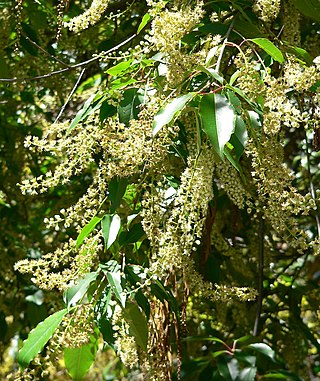
Rosaceae, the rose family, is a medium-sized family of flowering plants that includes 4,828 known species in 91 genera.

A plum is a fruit of some species in Prunus subg. Prunus. Dried plums are most often called prunes, though in the United States they may be just labeled as 'dried plums', especially during the 21st century.

Prunus is a genus of trees and shrubs, which includes the fruits plums, cherries, peaches, nectarines, apricots, and almonds.

Prunus subg. Padus is a subgenus of Prunus, characterised by having racemose inflorescences. Padus was originally a distinct genus, but genetic and morphological studies have shown that Padus is polyphyletic. It has been proposed that all the racemose taxa within Prunus are incorporated into a broad-sense Prunus subg. Padus.

Prunus serotina, commonly called black cherry, wild black cherry, rum cherry, or mountain black cherry, is a deciduous tree or shrub of the genus Prunus. Despite being called black cherry, it is not very closely related to the commonly cultivated cherries such as sweet cherry, sour cherry and Japanese flowering cherries which belong to Prunus subg. Cerasus. Instead, P. serotina belongs to Prunus subg. Padus, a subgenus also including Eurasian bird cherry and chokecherry. The species is widespread and common in North America and South America.

Prunus emarginata, the bitter cherry or Oregon cherry, is a species of Prunus native to western North America, from British Columbia south to Baja California, and east as far as western Wyoming and New Mexico. It is often found in recently disturbed areas or open woods on nutrient-rich soil.
Prunus arborea is a species of plant in the family Rosaceae. It is found in Indonesia, Malaysia, Singapore, and Thailand.
Prunus grisea is a species of plant in the family Rosaceae. It is found in Malaysia, the Philippines, Singapore, and Taiwan.
Prunus laxinervis is a species of plant in the family Rosaceae. It is found in Indonesia and Malaysia.

Prunus mexicana, commonly known as the Mexican plum, Inch plum, and Bigtree plum, is a North American species of plum tree that can be found in the central United States and Northern Mexico.
Sergio Enrique Villarreal Barragán, a.k.a. El Grande,, is a Mexican former federal police officer who then worked as a lieutenant for Arturo Beltrán Leyva of the criminal organization called the Beltrán Leyva Cartel. He got his name El Grande because he is 6 feet 7 inches (2.01 m) tall.

Prunus subg. Prunus is a subgenus of Prunus. This subgenus includes plums, apricots and bush cherries. Some species conventionally included in Prunus subg. Amygdalus are clustered with plum/apricot species according to molecular phylogenetic studies. Shi et al. (2013) has incorporated subg. Amygdalus into subg. Prunus, thereby including almonds and peaches in this subgenus. The species in this subgenus have solitary flowers or 2–3 in a fascicle.
Prunus gentryi is a species of wild cherry in the genus Prunus, family Rosaceae, native to the Mexican states of Chihuahua and Sonora. It grows along streambanks in mountainous regions of the Sierra Madre Occidental. The scientific description was published in 1937.

Prunus myrtifolia, called the West Indies cherry or myrtle laurel cherry, is a New World species of shrubs in the family Rosaceae.
Prunus cortapico is a species of tree in the family Rosaceae, and is native to Mexico, Guatemala and El Salvador.

Prunus brachybotrya is a species of tree in the family Rosaceae. It is native to Mexico. Individuals have been found growing in Central American countries. The resplendent quetzal has been observed feeding on this tree.
Prunus rhamnoides, Spanish: coralillo, Nahuatl languages: calaomit, and also iza and mataiza, is a species of Prunus in the family Rosaceae. It is native to Mexico and Central America. It is a tree 7.5 to 15 m tall. A shade tolerant species, it is considered an indicator of forest health. Local people use its timber for construction and household implements.
Prunus wurdackii is a species of Prunus found only on the slopes of tepuis of the Chimantá Massif in Venezuela, at 900 to 2200 m in elevation. Judging from its morphology, it is closely related to Prunus espinozana, described in the same publication. It is a tree 3 to 15 m tall, with branchlets that are brown tending to black. It differs from Prunus littlei, another close relative, in having thicker, more leathery and more lustrous leaves, with longer petioles. Its solitary inflorescences, by contrast, have shorter pedicels and shorter styles. Its calyx is salmon-colored, and the petals white.
Prunus annularis is a species of Prunus in the family Rosaceae. It is native to cloud forests along the Pacific coasts of Mexico and Central America. It is a tree 5 to 12 m tall. It is fed upon by caterpillars of the genus Oxynetra.

Prunus sect. Microcerasus is a section of Prunus. It used to be included in Prunus subg. Cerasus, but phylogenetic research indicates it belongs to Prunus subg. Prunus. It differs from Prunus subg. Cerasus by having three winter buds per axil.










